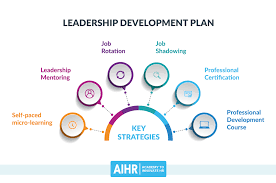The Essence of Leadership
Leadership is a multifaceted concept that plays a crucial role in various aspects of life, from business and politics to community organizations and personal relationships. At its core, leadership is about inspiring and guiding others towards a common goal or vision.
A true leader possesses a unique set of qualities that set them apart from others. These qualities include:
- Vision: A leader has a clear vision of what they want to achieve and can communicate this vision effectively to inspire others.
- Integrity: Integrity is the foundation of good leadership. A leader with integrity earns the trust and respect of those they lead.
- Empathy: Understanding the emotions and perspectives of others is essential for effective leadership. Empathetic leaders can connect with their team on a deeper level.
- Communication: Strong communication skills are vital for conveying ideas, providing feedback, and fostering collaboration within a team.
- Adaptability: In today’s fast-paced world, leaders must be adaptable and open to change. Adaptable leaders can navigate challenges with resilience and creativity.
Leadership is not about wielding power or authority; it’s about serving others and empowering them to reach their full potential. A good leader leads by example, motivates through inspiration, and fosters a culture of growth and development.
Effective leadership can drive innovation, foster teamwork, and create positive change in organizations and communities. By cultivating strong leadership skills within ourselves and others, we can build a brighter future filled with collaboration, creativity, and success.
Whether you’re leading a team at work, volunteering in your community, or guiding your family at home, remember that true leadership is not about being in charge – it’s about taking care of those in your charge.
Top 8 Frequently Asked Questions About Leadership
- What is leadership and why is it important?
- What are the key qualities of a good leader?
- How can someone improve their leadership skills?
- What is the difference between leadership and management?
- Can leadership be learned or is it innate?
- How does effective communication play a role in leadership?
- What are common challenges faced by leaders in today’s workplace?
- How can leaders motivate and inspire their team members?
What is leadership and why is it important?
Leadership is the art of guiding and inspiring individuals or groups towards a common goal or vision. It involves setting a direction, motivating others, and fostering collaboration to achieve desired outcomes. Leadership is important because it provides direction and stability, inspires innovation and growth, builds strong relationships, and empowers individuals to reach their full potential. Effective leadership can drive organizational success, create a positive work culture, and foster personal development. By cultivating strong leadership skills, individuals can make a meaningful impact on their teams, organizations, and communities.
What are the key qualities of a good leader?
When exploring the question “What are the key qualities of a good leader?” several essential traits come to mind. A good leader embodies qualities such as strong communication skills, integrity, empathy, adaptability, and a clear vision. Effective communication allows a leader to articulate goals and inspire their team. Integrity builds trust and credibility, while empathy fosters understanding and connection with others. Adaptability enables leaders to navigate challenges and change with resilience. A clear vision provides direction and purpose, guiding both the leader and their team towards success. These key qualities collectively contribute to a well-rounded and impactful leadership style that inspires, motivates, and empowers others to achieve common goals.
How can someone improve their leadership skills?
Improving leadership skills is a continual journey of self-discovery and growth. One effective way to enhance leadership abilities is through self-reflection and seeking feedback from peers, mentors, and team members. By identifying strengths and areas for development, individuals can tailor their learning and growth strategies. Engaging in leadership development programs, workshops, and reading relevant literature can also provide valuable insights and tools for honing leadership skills. Additionally, practicing empathy, active listening, effective communication, and fostering a culture of collaboration can help individuals become more impactful leaders. Embracing challenges, learning from failures, and staying open to new perspectives are key elements in the ongoing process of improving leadership skills.
What is the difference between leadership and management?
The distinction between leadership and management lies in their fundamental approaches and focuses. While management is primarily concerned with planning, organizing, and controlling resources to achieve specific goals and objectives efficiently, leadership emphasizes inspiring and guiding individuals towards a shared vision or goal. Managers typically administer tasks, processes, and systems to ensure operational success, while leaders motivate, empower, and influence people to realize their full potential and drive meaningful change. In essence, management is about handling complexity and ensuring order, whereas leadership is about inspiring innovation, fostering growth, and building strong relationships within a team or organization. Both roles are essential for the success of any endeavor but require distinct skill sets and mindsets to effectively navigate challenges and achieve sustainable results.
Can leadership be learned or is it innate?
The age-old question of whether leadership is a trait that one is born with (innate) or a skill that can be developed through learning and experience continues to spark debate. While some may argue that certain individuals possess natural leadership qualities from birth, such as charisma or decisiveness, many experts believe that leadership is a skill that can be honed and cultivated over time. Through education, mentorship, practice, and self-reflection, individuals can learn to become effective leaders by developing qualities like communication, empathy, adaptability, and vision. Ultimately, while some aspects of leadership may come more naturally to some individuals, the consensus is that leadership can indeed be learned and refined through dedication and effort.
How does effective communication play a role in leadership?
Effective communication plays a pivotal role in leadership as it is the cornerstone of building trust, fostering collaboration, and inspiring action within a team or organization. A leader’s ability to communicate clearly, openly, and empathetically enables them to convey their vision, expectations, and feedback effectively. By listening actively to their team members, addressing concerns transparently, and providing timely updates, a leader cultivates a culture of transparency and mutual respect. Through effective communication, a leader can align goals, resolve conflicts constructively, and motivate individuals to work towards a common purpose with clarity and unity.
What are common challenges faced by leaders in today’s workplace?
In today’s workplace, leaders often face a myriad of challenges that require adaptability and strategic thinking. Common issues include navigating rapid technological advancements, managing diverse and remote teams effectively, fostering a culture of innovation while balancing risk management, addressing employee burnout and mental health concerns, and staying agile in the face of unpredictable market shifts. Leaders must also contend with the pressures of maintaining work-life balance, promoting diversity and inclusion, and ensuring transparent communication across all levels of the organization. By proactively addressing these challenges with empathy, resilience, and a growth mindset, leaders can steer their teams towards success in an ever-evolving business landscape.
How can leaders motivate and inspire their team members?
Leaders can motivate and inspire their team members by fostering a positive and supportive work environment where individuals feel valued, empowered, and appreciated. Effective leaders recognize the unique strengths and talents of each team member and provide opportunities for growth and development. By setting clear goals, providing regular feedback, and recognizing achievements, leaders can instill a sense of purpose and motivation in their team. Additionally, leading by example, demonstrating integrity, empathy, and resilience, can inspire team members to strive for excellence and collaborate towards shared success. Communication plays a key role in motivation – keeping team members informed, engaged, and involved in decision-making processes can enhance their sense of ownership and commitment to the team’s goals. Ultimately, leaders who prioritize building strong relationships with their team members, fostering a culture of trust and collaboration, are more likely to motivate and inspire their teams to achieve greatness.



